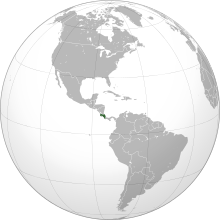LGBT rights in Costa Rica
| LGBT rights in Costa Rica | |
|---|---|

|
|
| Same-sex sexual activity legal? | Legal since 1971 |
| Gender identity/expression | - |
| Military service | No armed forces |
| Discrimination protections | Sexual orientation protections since 1998 |
| Family rights | |
| Recognition of relationships |
Yes for some purposes |
| Adoption | Legal, only if requested individually |
Lesbian, gay, bisexual, and transgender (LGBT) persons in Costa Rica may face legal challenges not experienced by non-LGBT residents. Same-sex sexual relations have been legal since 1971. Since 2013, households headed by a same-sex couples can obtain some domestic partnership benefits.
Homosexuality first became classified as a grave sin and crime during the Spanish rule. After gaining independence, it remained a crime until the liberal presidency of Tomás Guardia. While it was decriminalized during this era as part of a larger reform of the legal system, homosexuality was still widely seen as an "infamous sin".
In 1971, a universal age of consent was established as was a new law that prohibited "scandalous sodomy" but otherwise maintained the legal status of private homosexual sex acts between consenting adults. Article 382 in the Penal Code that mentions "scandalous sodomy" was repealed in 2002, alongside many other laws.
While homosexuality was technically legal, police harassment and raids of LGBT people and private establishments were formerly commonplace. In 1990, for instance, Minister of Government Antonio Alvarez Desanti announced that he would not allow foreign women to enter Costa Rica to participate in an "Encuentro," an international meeting of lesbians. He instructed Costa Rican consulates not to grant visas to women travelling unaccompanied by men, warning that all such women would be stopped at the airport.
He also informed airlines that if they sold tickets to women travelling alone, or appearing likely to attend the meeting, they would be required to provide for the suspected lesbians' immediate return. When pressed to explain how lesbians could be identified at the airport, he reportedly asserted that women who had short hair, wore pants, or travelled alone could be identified as lesbians. Organizers changed the dates and location of the meeting, and it finally took place.
Furthermore, the government did not want to grant legal recognition to political organizations seeking to advance LGBT rights. These policies started to change in the 1990s, when the Supreme Court of Justice of Costa Rica ruled that the constitution gave LGBT people the right to peaceful assembly, associate, create their own private establishments, as well as their own LGBT rights associations.
...
Wikipedia
